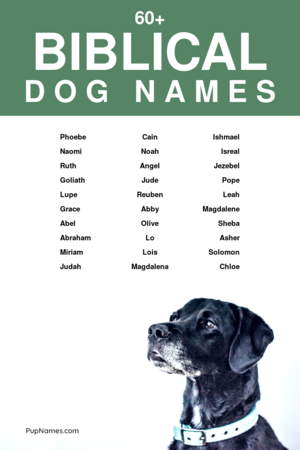In contemporary society, the act of naming pets—particularly dogs—can often feel trivial. Yet, the significance of a name can reflect much about the owner’s values, beliefs, and cultural backgrounds. Taking into account the rich tapestry of biblical names offers not only an opportunity to imbue our canine companions with meaningful titles, but also to explore deeper spiritual roots interlaced within the narratives of these names. This examination proposes the question: Can a name, deeply rooted in spirituality and cultural tradition, influence the way we perceive and bond with our pets?
Venturing into the realm of biblical names, one finds a plethora of options that have transcended time and cultural shifts, revealing their profound significance across various civilizations. Given the universal nature of biblical narratives, these names carry with them histories that are layered with symbolism, moral lessons, and communal identities. Each name has a story, and each story is a thread in the larger tapestry of human experience.
When selecting a biblical name for a male dog, it is essential to consider not just the phonetics or the aesthetic appeal of the name, but its broader implications. One notable example is the name “David.” This name invokes the image of a shepherd boy who became a king—a symbol of leadership, courage, and humility. The biblical account of David embodies a journey from adversity to triumph, and perhaps your canine companion can resonate with that narrative of growth and nobility.
Another compelling name is “Gabriel.” Traditionally associated with the archangel who serves as a messenger, Gabriel embodies the qualities of communication and faith. For a dog known for its faithful companionship and ability to ‘speak’ without words through loyalty and affection, this name may aptly reflect the bond shared between dog and owner. It also invites inquiry into whether an ethereal character like Gabriel can indeed inhabit the spirit of a pet.
There exists a challenge when utilizing biblical names: do they carry an inherent weight that transcends mere nomenclature? One might argue that ascribing a name laden with spiritual significance to a dog could impose anthropocentric values onto a being distinctly different from humans. This brings forth the question of cultural relativism—Does applying such names to pets reflect an appropriation of sacred heritage, or does it foster a respectful homage to a shared story?
Cultural relativism illuminates the varying understandings and interpretations of names across societies. While some may perceive the adoption of biblical names for dogs as trivialization, others might embrace it as an extension of loving reverence. Names like “Noah,” representing hope and refuge, could symbolize the unconditional love and sanctuary a dog offers its owner. In this light, such names become more than mere labels; they transform into expressions of relationships that span beyond this earthly realm.
As we further explore this topic, one cannot overlook “Moses.” A profound name for a male dog, deriving from the leader who liberated the Israelites from bondage, symbolizes resilience, determination, and strength. These qualities are often mirrored in our dogs, who stand by us through the trials of life. Naming a dog Moses can act as a daily reminder of freedom, loyalty, and the power of companionship that transcends adversity.
Moreover, consider the name “Isaiah.” Often regarded as a prophet, Isaiah is emblematic of wisdom and foresight. For a dog that exhibits a seemingly intuitive understanding of human emotion, choosing this name may reflect the deep connection and responsiveness that exists in pet ownership. It raises an intriguing discussion surrounding the ability to ascribe human-like qualities to our pets and how this behavior can shed light on our own spiritual and emotional landscapes.
The conundrum deepens when one probes into the names that are less commonly chosen. “Ezekiel,” derived from the Hebrew word meaning “God will strengthen,” showcases a more profound robustness compared to more pedestrian pet names. By naming a dog Ezekiel, one acknowledges not just a connection to the biblical narrative, but also invokes a sense of strength that may be particularly applicable in training and companionship—an interesting dynamic indeed.
In conclusion, the act of selecting a biblical name for a male dog yields far-reaching implications that extend beyond simple naming conventions. It engages us in a dialogue about cultural identity, personal belief, and the spirituality inherent in our relationships with these animals. Names such as David, Gabriel, Noah, Moses, and Isaiah not only provide a semblance of character and identity to our beloved pets but also cultivate an environment where we acknowledge the deeper connections we share through cultural narratives. This integration of faith, history, and companionship leads us to ponder: Do the names we choose for our pets reflect our spiritual beliefs, and, importantly, how do these names ultimately influence the relationships we build with them? Understanding the implications of our choices in this context enriches our connection with our canine companions and opens the door to a fuller appreciation of their place within our lives.
